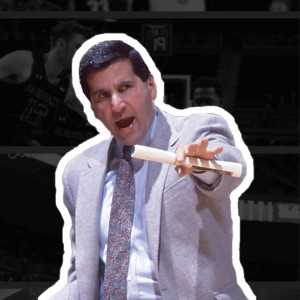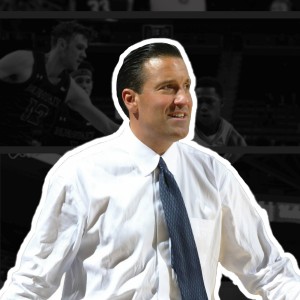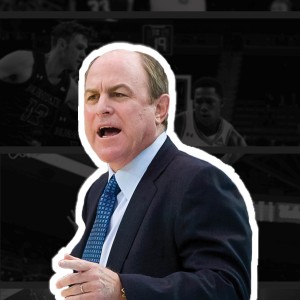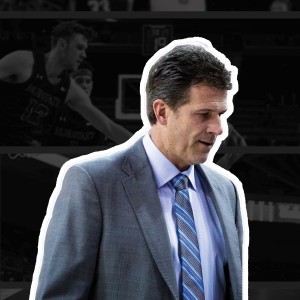UCLA men’s basketball has only had four coaches in the past 31 seasons, but the prestigious program has just one national championship to its name in that time. With a highly anticipated coaching search on the horizon, Daily Bruin Sports reflected on the Bruins’ past four coaches to see how the expectations and performances have changed over time.
Jim Harrick (1988-1996)
After a previous stint as an assistant coach, Jim Harrick’s eight-season run as head coach in Westwood culminated in one of the oddest coaching departures from UCLA – only one year removed from an NCAA championship, no less.
Harrick’s undoing hinged on a recruiting dinner at which then-UCLA players Cameron Dollar and Charles O’Bannon were present, among others. Since Harrick charged the entire meal on his tab, Dollar and O’Bannon technically violated NCAA rules by receiving extra benefits. Harrick made matters much worse by lying about the players’ presence at dinner and encouraging a member of his coaching staff to support his lies.

All this led to then-Athletic Director Pete Dalis offering Harrick an ultimatum – resign or be fired without pay.
He chose to get fired, ending the most successful run of any UCLA coach since John Wooden. Harrick remains the only Bruin coach other than Wooden to win an NCAA championship.
In a weird twist, current Golden State Warriors President of Basketball Operations and General Manager Bob Myers played for Harrick and was also present at the dinner as a student-athlete host. Myers is one of the members of UCLA’s search committee for the current head coach opening.
The Bruins’ 1994-95 national championship team featured former guard and current assistant coach Tyus Edney, whose full-court sprint and layup in 4.8 seconds defeated Missouri at the buzzer in the second round NCAA tournament. Forward Ed O’Bannon scored 30 points and pulled down 17 rebounds in UCLA’s 89-78 win over Arkansas in the national championship game.
Despite Harrick’s success, his tenure was also marked by underachievement. His teams lost in the first two rounds of the NCAA tournament five times, even though the Bruins were infused with stars such as O’Bannon, Tracy Murray, Edney and Don MacLean, the leading scorer in UCLA and Pac-12 history.
What UCLA can learn from the Harrick era is that its men’s basketball coach should be honest and own up to their mistakes. Oh, and also recruit a couple superstars to set the table for another potential championship.
Steve Lavin (1996-2003)
Out of the ruins of the Harrick fiasco emerged Steve Lavin.
Or as his detractors describe it, nepotism, since Lavin was the longest-tenured assistant coach at the time of Harrick’s firing.
Because of various highly ranked recruiting classes and a less-than-stellar coaching resume, Lavin bears noteworthy resemblance to former coach Steve Alford, who was fired just before Pac-12 play began this season.

Lavin brought in future NBA talents such as Baron Davis, Matt Barnes, Dan Gadzuric and Jason Kapono. Under Lavin, UCLA made the NCAA tournament in each of his first six seasons, losing in the Elite Eight once, the Sweet 16 four times and the first round once.
But with the recruiting eventually going dry, his last season was nothing short of a disaster.
The Bruins finished 10-19, the worst post-Wooden record in school history, with losses to the University of San Diego and Northern Arizona in addition to a 10-game conference play losing streak.
Lavin’s tenure is largely responsible for beginning the media narrative that UCLA’s men’s basketball coaches must achieve nothing short of absolute excellence.
“Clearly not the success expected at UCLA, because there it has to be national championships and Final Fours or you’re out,” Lavin told the Orange County Register in 2011. “But I understand that comes with the territory so I never really took offense to it.”
Lavin, like Alford, was known as a player’s coach, but that didn’t mean he did much coaching.
During a Golden State Warriors shootaround at Pauley Pavilion in 2007, Davis reportedly said that UCLA was the only team to make the NCAA tournament without a coach, referring to Lavin.
At the very least, Lavin represents a worst-case scenario if UCLA accepts the path of least resistance in its search for a head coach. Without a doubt, he showed that the Bruins could recruit NBA-caliber talent. The bigger issue is implementing a system to turn an entire team into a cohesive unit.
Ben Howland (2003-2013)
The last time the Bruins were consistently relevant on the national stage, Ben Howland was in charge.
Howland racked up the second-most wins in school history, sticking around for 10 seasons and making three straight Final Fours in 2006, 2007 and 2008.
But he didn’t do it alone.
Just like any other UCLA coach over the past 50 years, Howland was able to reel in top talent to help the Bruins reach the next level. While he never won a championship in Westwood, superstars Russell Westbrook, Kevin Love and Arron Afflalo carried UCLA into the spotlight and kept the Bruins’ offense running like a well-oiled machine.
Howland’s downfall, however, was that he wasn’t an offensive coach. There’s nothing wrong with that, as long as you’re winning.
Shabazz Muhammad – one of the best recruits in UCLA history – came around during the twilight of the Howland era. By the time he got to town, Howland’s coaching style had worn thin, fans were no longer on board and attendance was dropping drastically.

The Bruins lost in the first round of the NCAA tournament and Howland was axed.
“We don’t want to bring in a coach who averages 50 points per game,” said Athletic Director Dan Guerrero after firing Howland.
Guerrero wanted fun, and Howland wasn’t that. He may have had fun players at his disposal at the peak of his power with the Bruins, but he was criticized for calling too many timeouts, over-substituting and running a generally slow offense.
There’s a similar sentiment on campus now – the talent has been here, but the coaching style has been too rigid and stale for the team to overachieve. UCLA needs to find a player-friendly coach who can turn all this skill into a high-powered, well-run offense.
But most importantly, Howland taught the Bruins that talent can overcome anything, as long as that talent is top-level. Recruit the best, and the success will come with them. Tailor the coaching style to each year’s team and go from there.
Steve Alford (2013-2018)
Steve Alford’s five-plus years on the UCLA bench were filled with just as much disappointment as they were excitement.
The former Bruins coach replaced Ben Howland in 2013 after UCLA got bounced in the first round of the NCAA tournament by Minnesota, finishing that year with a 25-10 overall record and a regular season Pac-12 title.
Soon after taking over, Alford began to build a strong reputation as a recruiter, eventually helping him pull in big-name recruits like Lonzo Ball, TJ Leaf, Kris Wilkes and Moses Brown. However, he was never able to lead his top-ranked recruiting classes deep into the postseason.
In each of his first two seasons, Alford took the Bruins to the Sweet 16, but failed to advance any further. In 2015-2016, UCLA had just its fourth losing season since 1948 and finished 10th in the Pac-12 with a 15-17 record.

The Bruins reloaded the following season with a roster headlined by five-star freshmen Lonzo Ball and TJ Leaf, as well as the veteran experience of then-seniors Bryce Alford and Isaac Hamilton.
UCLA started that season 13-0 and picked up what could have arguably been the best win of Steve Alford’s coaching career along the way. The then-No. 11 Bruins went into Rupp Arena and downed then-No. 1 Kentucky, catapulting UCLA to No. 2 in the next AP poll – its highest ranking ever under Alford.
The Bruins went on to finish that season 31-5, but suffered yet another disappointing Sweet 16 exit after De’Aaron Fox and the Wildcats avenged their earlier loss with an 86-75 victory over the Bruins.
Ball and Leaf left the program for the NBA that offseason, while Bryce Alford and Hamilton graduated – setting the table for Steve Alford’s eventual downfall.
After trying to ride Aaron Holiday’s heroics to glory in 2017-2018, a First Four drubbing at the hands of St. Bonaventure had Steve Alford’s seat getting even hotter than it had already been.
Despite Steve Alford showing no concern over his job security heading into this season, a tumultuous nonconference portion of the schedule was the last straw for Athletic Director Dan Guerrero.
Guerrero fired Steve Alford in December before the start of Pac-12 play. Alford finished his UCLA coaching career with a 124-63 record and three Sweet 16 appearances, but the feeling of missed opportunity will forever be linked to his time in Westwood.
At some point in the next few months, UCLA will have to make a decision that will shape the future of the program. Guerrero and the Bruins have their legacies on the line, and if they want to stay relevant on the national stage and preserve the program Wooden built, they have to learn their lessons from their past four hires.
